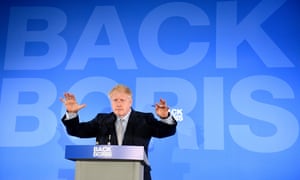The Guardian e
The Tory leadership battle is making Britain the kind of nation we used to laugh at...
Boris Johnson’s rise shows a cosiness between Westminster and the media that we’d once only see in a faraway land
 ‘Close scrutiny by MPs is Johnson’s biggest headache.’ Boris Johnson at his leadership campaign launch in London, June 2019. Photograph: Neil Hall/EPA
‘Close scrutiny by MPs is Johnson’s biggest headache.’ Boris Johnson at his leadership campaign launch in London, June 2019. Photograph: Neil Hall/EPAI
magine a faraway country, where an influential but controversial business with deep pockets hires itself a senior politician. It’s all perfectly above board, of course. He gets £275,000 a year for a few hours’ work a week, duly delivered to everyone’s satisfaction, while harnessing the company’s considerable soft power to support his personal and political ambitions.
In due course, he runs for prime minister, with the company cheerleading all the way. Nobody is so unspeakably vulgar as to suggest any kind of quid pro quo. But if he wins, he will be legislating on matters of great interest to this company, from the tax affairs of its owners to the commercial conditions under which it operates. There is a minor uproar about all this, but people are largely resigned to the way things work in this country now. Besides, scandal has always miraculously slid off this particular politician without leaving a mark.
This faraway country doesn’t feel quite so far away any more. When Boris Johnson launched his leadership campaign, the Daily Telegraph’s front pagewas an enormous picture of its star columnist over the headline “It’s time to remember our duty to the people”. The day after he romped into the lead in the first ballot of Conservative MPs, it trumpeted the Johnson camp’s call for half his rivals to abandon the race so it could be wrapped up more quickly. Close scrutiny by MPs, who know his weaknesses better than anyone else, is Johnson’s biggest headache – so his strategy is to rush through this dangerous early stretch of the journey at top speed while giving away as few hostages to fortune as possible.
The campaign message is that a Johnson victory is practically a done deal, so everyone should stop asking questions and leap aboard. It smacks both of avoiding scrutiny and taking supporters for granted, yet so far he enjoys the unflagging support of a newspaper read religiously by Tory members.
In fairness to both Johnson and his employers, they’re hardly the only ones blurring the already murky boundaries between politics and the media. Nigel Farage has a weekly phone-in show on the LBC radio station, providing him with publicity a new fringe party couldn’t otherwise buy; he went off air during the European elections to comply with Ofcom’s broadcasting regulations but was back within days of the Brexit party topping the polls. We don’t know yet what the editor of the London Evening Standard will make of what looks like a coming grudge match between Johnson and Farage. But as he worked alongside one of them before losing a referendum to them both, George Osborne should certainly have the inside track.
Michael Gove doesn’t have his own newspaper column any more, but fortunately his wife, Sarah Vine, does – and she was on hand to explain at length to Daily Mail readers why its revelation that her husband had snorted cocaine in the past wasn’t as bad as it sounded. Up until Esther McVey was knocked out of the leadership race amid a public clash with some old colleagues from breakfast telly, three of the 10 hopefuls running for prime minister came up from the media. No doubt if he makes it to Downing Street Johnson will give up his side hustle. Who knows, he may still have enough ink in his blood to turn and cheerfully bite the hand that fed him. But that doesn’t solve the bigger problem that politics and journalism have become unhealthily intertwined.
In any leadership contest, British newspapers will pick a horse and champion it, sometimes to the extent of practically sleeping in the stables. There has long been a revolving door between Fleet Street and Whitehall, with journalists morphing into spin doctors for parties of both left and right, while former Downing Street aides land newspaper columns in which to argue that their former bosses can’t get it right without them. But we’ve now reached a new level of incestuousness, and frankly it stinks. What on earth are voters – who already think Westminster is too cosy by half, that everybody in power seems to know everyone else, and that their interests overlap suspiciously often – to make of it? Yet the former Telegraph editor Charles Moore – authorised biographer of Margaret Thatcher, shooting chum of David Cameron, former employer of Johnson, speaking today as a guest on Radio 4’s Today programme – had the chutzpah to suggest that the “mainstream media establishment” is somehow ganging up on plucky little Boris.
This is the kind of thing British people used to boggle at from afar, thinking smugly that it could never happen to us. We were nothing like Italy, where media mogul Silvio Berlusconi rose to power as the owner of three national TV channels and seedy stories about sex parties were pushed under the carpet. We weren’t the US, where reporters were physically threatened at rallies while ferociously rightwing parts of the media helped steer voters behind Donald Trump. That looks pretty complacent after Johnson’s campaign launch this week, when his supporters booed a journalist for asking a difficult question – an ominously Trumpian habit.
Whatever the failings of Britain’s regulatory system, it does at least have well-worn mechanisms to deal with the threat of one media mogul acquiring too many news outlets, or broadcasters failing to remain impartial. But apart from professional pride, it’s less obvious what stands in the way of more newspapers and commercial radio stations meekly handing the microphone to politicians who happen to look like winners. And the trouble with such rampant partisanship is it’s infectious, pushing others to pick a side or risk falling behind those who do. That faraway country, where readers barely know who to trust, doesn’t feel nearly far enough.
• Gaby Hinsliff is a Guardian columnist
-------------------------------------------------------------------------------------------------------------------
My Comments :
The Tory leadership battle is making Britain the kind of nation we used to laugh at
1. Sorry to rudely interrupt your analyses and rob you from your seemingly conclusive considerations, but I do remember the rather overt activities of a certain Australian newspaper mogul, paving the way in the UK during the eighties for one of the (more famous) political predecessors of Johnson.
2. The very same newspaper mogul had also to be courted intensely (and humiliatingly) for electoral support (for his royal approval even), before a certain Labour politician was allowed to win an election or two in the UK (a Labour politician, that subsequently supported a Holy War in the Middle East, maybe as a direct consequence of the support from the media-mogul from Australia, who (conveniently) has since been naturalised into an evenly powerful USA citizen).
So : Nothing is new and nothing has changed.
3. However, to be honest with you, some things did change since those dark ages, because a new development has entered the electoral stage and political arena, namely the introduction of stealth personal voter-targeting by hard to identify electioneering firms, that are hired in by the usual vested interests with infinite financial sources.
4. Shady Electioneering firms, that might even have delivered the quite unexpected Brexit outcome of the advisory referendum in 2016, which bizar outcome is at the very centre of the totally unhinged UK politics right now, with the rather weird exponent Boris Johnson at the very forefront of the mews media.
5. Shady Electioneering firms that are selling their ICT related capacity as well to a range of so-called security services, like the CIA and to international common defense institutions, like NATO.
6. "Defense" Alliances like NATO, that are using the stealth power of those shady electioneering firms, to accomplish Regime Change in faraway countries, elsewhere on our planet earth.
7. Regime Change by software power that is, when possible and Regime Change by the use of hardware power, when (considered) necessary.
8. So, please do grow up, and open up your eyes to the new harsh reality, where security services and defense alliances seem to be allowing to have our precious western democracies to be fundamentally corrupted by - and possibly even in close cooperation with - shady billionaires, like Robert Mercer, the former owner of the now defunct Cambridge Analytica and the Koch Brothers.
9. Cambridge Analytica that once - before it went all miserably wrong - had its mother-company (the SCL group) notably based in London UK.
10. Cambridge Analytica - a firm that meanwhile already has been replaced by numerous other anonymous electioneering companies - that has been able to indoctrinate completely unaware voters in order to, either vote for a certain candidate or party, or to stealthily discourage voters, to vote for the candidate / party they inclined to vote for, before they were interrupted by personalised coded messages, fired upon them covertly, by way of our social media.

Geen opmerkingen:
Een reactie posten
Opmerking: Alleen leden van deze blog kunnen een reactie posten.